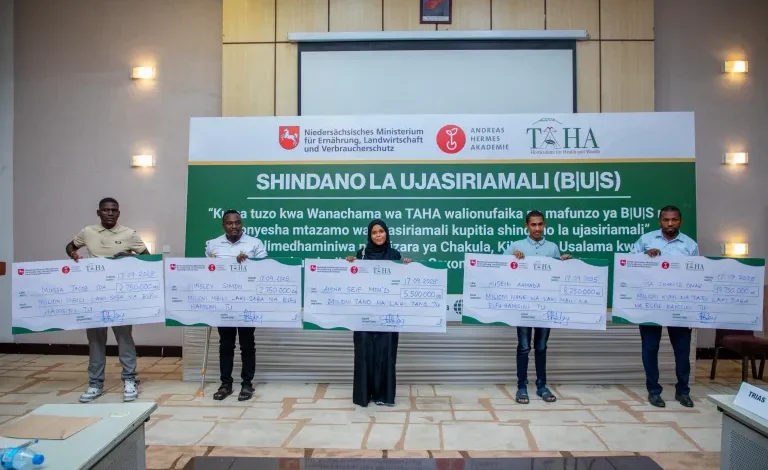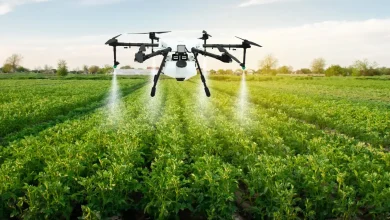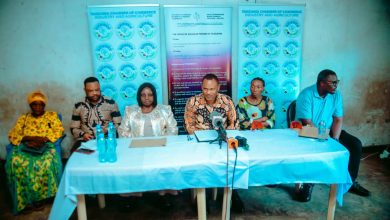TAHA empowers 50,000 youth, women through BUS training

ARUSHA: OVER the past five years, the Tanzania Horticultural Association (TAHA) has empowered more than 50,000 youth and women entrepreneurs across Tanzania Mainland and Zanzibar through its tailored BUS (Bäuerliche Unternehmer Schulungen) training programme, designed to nurture innovative and market-driven minds.
Chief Programme Manager for TAHA, Mr Simon Mlay said over the weekend that at least 5,000 outstanding trainees with winning business pitches received grants to overcome start-up challenges, including access to machinery critical for launching their ventures.
“For those who did not secure grants, the programme created vital linkages to financial institutions for loans and market access support,” Mr Mlay said during the BUS award competition event held in Arusha.
Beyond training, BUS has fostered a vibrant alumni community that gathers annually to celebrate success stories, exchange ideas and tackle emerging challenges together.
“Every year, we witness new ideas and greater awareness driving young people to draft business blueprints and seize growth opportunities,” said Coordinator of the BUS training Mr Alex Allen.
Traditionally, most smallholder farmers in Tanzania focus on subsistence farming, often viewing market-oriented practices, collaborations, or innovation as luxuries. BUS has been changing this mindset.
Through its participatory, needs-based approach, BUS equips farmers to assess their local realities, recognise their strengths, and align production with actual market demand.
“Once awakened, farmers start to see their future differently, shaping clear business concepts and actionable plans,” explained Master Trainer Mr Kassim Abdullah Kassim.
ALSO READ: TAHA eyes 57.5tri/- China fruit market
Unlike conventional entrepreneurship courses, BUS takes a three-stage approach: BUS I – Practical learning and self-discovery, helping trainees think beyond traditional methods.
BUS II provide business analysis and market creation, considered the most challenging stage, as it requires applying analytical skills and basic mathematics, while BUS III is focused on business planning mastery, empowering participants with the confidence and skills to turn their entrepreneurial visions into reality.
“Although TAHA designed BUS primarily for farmers and livestock keepers, its lessons apply to anyone, because ultimately, it unlocks the entrepreneur within,” Mr Kassim said.
One shining example is Issa Shamte Omar, a young banana farmer from Pemba. Inspired by BUS, he developed a plan to produce Bokashi, fermented organic compost that enriches soil and boosts yields.
Previously, Omar struggled during rainy seasons due to inadequate storage facilities, but after refining his pitch year after year, his persistence paid off. In the latest BUS cohort, he earned 13.75m/- in seed funding.
“I used to write the idea every year, but I did not win. I kept improving it, and this year, I successfully convinced the judges,” Mr Omar said, encouraging fellow trainees to “keep knocking.”
Other winners in the 2025 pitching contest included Mr. Hussein Ahmada, who secured 8.25m/-, Ms Amina Seif Mohamed, 5.5m/-, Mr Wisely Salim 2.75m/- and Mr Mussa Jacob, 2.75m/-.
The BUS programme’s impact is strengthened by a broad network of partners, including Andreas Hermes Akademie (AHA), co-developer of BUS modules; the Ministry of Agriculture and Food Security of Saxony, Germany; Tanzania Investment and Special Economic Zones Authority (TISEZA); local government authorities; commercial banks; and other development partners.
Together, they complement participants’ needs with access to finance, licensing, and markets.
So far, TAHA has trained 37 trainers of trainers, 29 from Zanzibar and eight from Arusha, Kilimanjaro and Manyara, who continue to spread BUS knowledge at grassroots level.
“This training is intensive. We keep class sizes small, around 20 per cohort, to ensure trainees grasp entrepreneurial concepts in depth,” Mr Allen explained.
TAHA’s Board Member, Dr Edmond Matafu, commended this year’s participants for their creativity, urging winners to scale their businesses and others to learn from setbacks.
Judges like Veronica Mrema of TISEZA highlighted the programme’s alignment with national policies on value addition, while Bahati Ntweve of Arusha City Council reminded farmers to constantly innovate in a competitive market.





